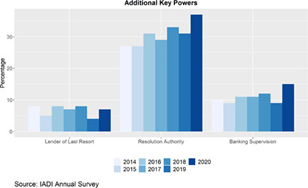People are the centre of the National Financial Inclusion Strategy
According to the World Bank (2012), financial consumer protection means that the legal system and government organizations are set up to operate and ensure the legitimate interests of financial consumers. The International Finance Corporation (IFC, 2015) defines financial consumer protection as any activity, action or set of rules that seeks to reduce risks and harms to consumers with the use of any financial product or service. So, protecting financial consumers is meaningful not only to individual consumers, but also plays a very important role in the financial inclusion of countries.
The National Financial Inclusion Strategy to 2025, with a vision to 2030, has considered people as the center, especially the poor people in remote and disadvantaged areas. Therefore, all policies issued must be directed to the people - financial consumers in each country. An effective consumer protection mechanism will be the key to ensure the success of a long-term financial inclusion strategy.
The role of financial consumer protection in promoting financial inclusion in each country is reflected in the following aspects:
Financial consumer protection helps customers be treated fairly in accessing and performing financial transactions, without discriminating against customers by income level, age, geographical distance …When all customers have the same opportunity to access and are not excluded from financial transactions, they will be more confident, knowledgeable and proactive in financial transactions, thereby choosing the best for their financial transaction. Hence, it contributes to the increase of financial transactions, promoting effective financial inclusion.
When financial consumers are protected and have the knowledge and skills to access financial products and services, they will contribute to a more effective financial participation process through assessment and habitual financial consumption. This will motivate financial institutions to provide services to improve and perfect their products and services to meet the increasingly diverse needs of customers. Therefore, an effective financial consumer protection mechanism will create conditions to improve service quality, improve capacity, thereby increasing the profits of financial institutions. This is also one of the tasks of the Financial Inclusion Strategy.
Currently, with the strong development of the industrial revolution 4.0, there are many new and high-tech financial services and products in the financial market. These products and services may not have a strict management mechanism, so they may pose many risks to consumers. Therefore, an effective financial consumer protection mechanism will create a stable environment to operate financial transactions, promote financial inclusion and sustainability.
DIV participates in protecting financial consumers
Vietnam currently has 5 agencies related to the protection of consumer interests in the financial sector, namely: The State Bank of Vietnam (SBV) managing the banking sector; The Ministry of Finance manages the securities and insurance sectors; The Ministry of Industry and Trade, the Ministry of Information and Communications and the Consumer Protection Association are responsible for consumer protection in general. All these 5 agencies have the ability to participate in the consumer protection process, but these agencies do not have a specialized department as well as a specific management process to carry out the task of consumer protection. There is no coordination mechanism to handle conflicts of interest that occur when using financial products and services.
The National Financial Inclusion Strategy to 2025, with a vision to 2030 has proposed solutions to focus on protecting financial consumers such as communication, education, knowledge improvement, financial literacy, and financial thinking and skills for people - financial consumers. Specifically, the banking industry needs to proactively come up with a group of solutions to support people and businesses. This is because financial and banking activities are likened to the "blood vessels" of the economy.
Referring to the goal of leaving no one behind in the Financial Inclusion Strategy, SBV Governor Nguyen Thi Hong emphasized: The strategy will cover all people, especially people in rural, remote areas. These are areas where people often face difficulties. The poor or small and medium enterprises account for 95% of the total number of businesses in Vietnam, so they are also an area that creates jobs for people or women - the subject who both manage the family's spending and are also the borrower of capital to serve production and business for life. They are also the main communication target that the deposit insurance policy is aimed at.
The objective of a deposit insurance policy is to protect the legitimate rights and interests of depositors - financial consumers in the economy. When depositors have knowledge and trust in financial institutions, financial transactions are promoted and people are encouraged to save money. Thereby, it contributes positively to the national financial inclusion. In Vietnam, the banking system is still the main source of capital for the economy, so depositors are a very important part of the economy. DIV was established with the mission of protecting the legitimate rights and interests of depositors, contributing to the stability and healthy development of the national financial system. Currently, DIV is protecting depositors at 1,283 insured institutions. DIV protects depositors through direct and indirect methods. Accordingly, the DIV indirectly protects the legitimate rights and interests of depositors by implementing operations such as supervising and periodic examination to detect and recommend the SBV to promptly handle violations of regulations on deposit insurance and safety in banking operations. In addition, in order to effectively participate in the restructuring process of weak credit institutions, the DIV also implements the following tasks: special lending to specially controlled credit institutions, participating in formulating the bankruptcy plan of the specially controlled credit institution, participating in the assessment of the feasibility of the recovery plab of the people's credit funds; promote and disseminate diverse deposit insurance policies through many channels and mass media to raise public awareness, especially towards students and depositors in remote and isolated areas who are vulnerable because of lack of financial information and knowledge.
In case the insured institution encounters an insolvency problem, the DIV will directly protect the depositors through the deposit insurance reimbursement to the depositors within the coverage limit prescribed by the law. The excess amount will be paid during the liquidation of the assets of the failed institution. As a result, depositors will feel more secure when depositing at credit institutions that participate in deposit insurance, thereby being more proactive in financial transactions, contributing to promoting financial inclusion.
After more than 20 years of operation, it can be said that DIV has well protected the legitimate rights and interests of depositors, which is also the protection of financial consumers - the subject, the focus of the National Financial Inclusion Strategy through concretizing deposit insurance policies, synchronously deploying operations to strengthen depositors' confidence in the financial system, raising financial awareness, so that people will make better choices in financial transactions, and at the same time be encouraged to use legal and legitimate financial services.
However, with the rapid and strong development of the banking system with a series of new products and services being introduced to the market, along with the trend of applying high-tech products has set challenges to the depositor protection mission of the DIV. Therefore, in the short term, the DIV should study to increase the insurance coverage limit; raise public awareness about deposit insurance, especially for those who are disadvantaged in society and have little financial knowledge such as the elderly, the disabled, people in remote areas... In the medium and long term, the DIV needs to study to apply the principles of financial consumer protection to improve the effectiveness of depositor protection.



























